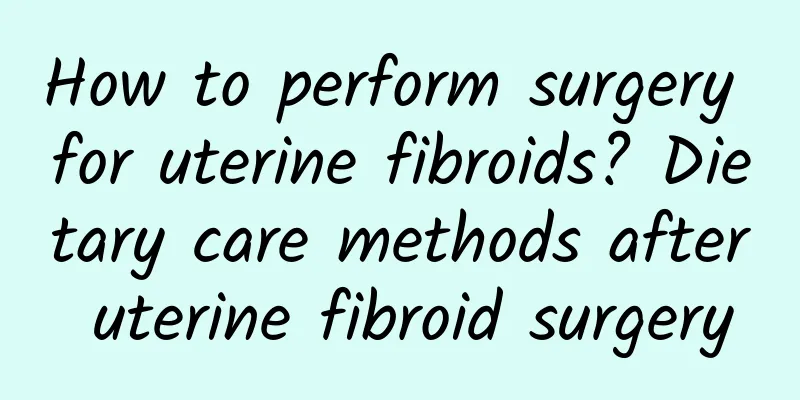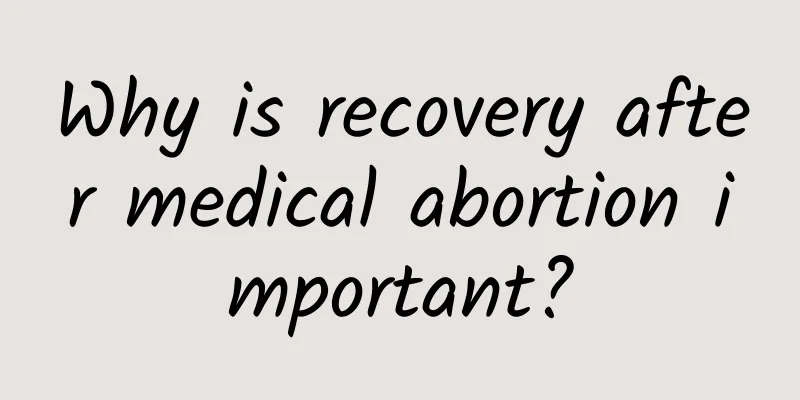How to perform surgery for uterine fibroids? Dietary care methods after uterine fibroid surgery

|
In recent years, as people's pace of life continues to accelerate, modern women are often busy with work and taking care of the family, always putting their health last, and health problems emerge in an endless stream. Uterine fibroids are a very common gynecological tumor in women. Among adult women, the incidence rate is as high as more than 20%, ranking first among common gynecological diseases. So, can you get pregnant with uterine fibroids? Will it affect fertility? Today, let's follow the authoritative gynecological experts to find out. Uterine fibroids are known as the "first gynecological tumor". It is said that according to the different growth sites of fibroids, they can be divided into intramural fibroids, submucosal fibroids, subserosal fibroids, etc. According to experts, most tumor patients have obvious early symptoms and can only be diagnosed during gynecological examinations. Can you get pregnant with uterine fibroids? It needs to be determined based on the specific situation of the patient. Patients with fibroids that are less than 4 cm and grow slowly can usually get pregnant, but there are risks. Uterine fibroids are hormone-dependent tumors that may have a certain impact on childbirth and milk production during pregnancy. Therefore, it is necessary to confirm whether you are pregnant after an examination by a gynecologist. For larger fibroids, generally more than 4CM, the growth rate is faster than usual. Doctors recommend treatment before pregnancy. Survey data show that among pregnant women, the miscarriage rate caused by uterine fibroids is as high as 25%. Experts point out that this is because fibroids often increase the area of the uterus, uterine curvature and endometrium; submucosal fibroids themselves grow in the uterus, just like foreign bodies in the uterus stimulate the uterus, promote its spasmodic contraction, and lead to miscarriage. How many surgeries are needed for uterine fibroids? Uterine fibroids, also known as uterine leiomyoma, are the most common benign tumors of the female genitalia. Most are asymptomatic, with a few showing vaginal bleeding, abdominal contact with the tumor, and compression symptoms. If the pedicle is twisted or other conditions occur, it will cause pain. Multiple uterine fibroids are common, and the exact cause is unknown. Modern Western medicine uses sex hormones or surgery for treatment, and there is no other ideal treatment method. Uterine fibroids are common in women aged 30 to 45 with strong ovarian function. After the age of 50, most fibroids shrink on their own due to the obvious decline in ovarian function. For those with small, single, and clinically asymptomatic uterine fibroids, they can be reexamined every 3 to 6 months to observe changes in the tumor. For those over 40 years old, with little menstruation. If there is no malignant change in the diagnosis, enhance self-care awareness, maintain mental comfort, pay attention to proper rest, and enhance nutrition. After the estrogen level drops after menopause, the fibroids can shrink or disappear naturally. If the tumor grows rapidly or the symptoms are obvious during follow-up, surgery should be performed regardless of age. Generally, fibroids smaller than 5 cm do not require surgery. Frequent menstruation or heavy menstruation can be treated by taking Guizhi Fuling Pills orally. After menopause, small uterine fibroids may shrink and disappear on their own. If they are larger than 5 cm and accompanied by symptoms, surgery is necessary. Pay attention to diet after uterine fibroid surgery 1. Cereals and grains In daily life, patients should try to eat more whole grains. The nutrients contained in this food are very suitable for women with bad uterus. For example, corn, beans and other whole grain foods, as well as some dried fruit foods such as peanuts, sesame seeds, melon seeds, etc., are essential for women to protect their uterus. At the same time, we should also pay attention to the fact that in our daily diet, we must ensure punctuality and quantity, and do not overeat. 2. Seaweed Food Women can also try to eat more seaweed in their daily lives, because they contain a lot of calcium, iron, sodium, magnesium, phosphorus, iodine and other mineral elements, which have a good protective effect on the uterus. Therefore, women may wish to add seaweed, kelp and other seaweed foods to their three meals a day to protect the uterus. Low-fat diet If you want to know what to eat is good for the uterus, you should pay attention to maintaining a low-fat diet in your daily diet, which can not only protect the uterus, but also prevent obesity. Therefore, women should eat more lean meat, celery, spinach, cucumber, tofu, kelp, cabbage, wakame, seaweed, fruits and other cold vegetables and fruits. These foods are low in fat, but also contain a lot of nutrients, which are beneficial to human health. Light food When it comes to what to eat that is good for the uterus, it is never wrong to keep a light diet. Experts point out that women with uterine fibroids should try to eat less irritating foods, such as lamb, shrimp, crab, pepper, onion, white wine and other foods and drinks. Especially for some women who have undergone uterine fibroid surgery, the diet should not be too good. While taking high-protein and high-calorie foods, the intake of vitamins should not be neglected. |
Recommend
Shape the S curve! Learn cat stretch yoga
Moderate yoga movements can not only exercise and...
How can patients with habitual miscarriage relieve symptoms? What are the symptoms of habitual miscarriage?
Patients with habitual miscarriage should avoid s...
Beijing Gynecological Hospital
A healthy body is the capital of revolution, espe...
What medicine can I take for a 6.0 uterine fibroid? What medicine can I take to eliminate a 6 cm uterine fibroid?
"What medicine can I take for a 6.0 uterine ...
Why is menstruation irregular?
Why is menstruation irregular? Irregular menstrua...
Common symptoms of uterine fibroids and adenomyosis
Uterine fibroids and adenomyosis are both common ...
Symptoms of uterine fibroids. Will uterine fibroids cause abnormal leucorrhea?
Uterine fibroids are one of the common diseases a...
What are the symptoms of female pelvic inflammatory disease? There are acute and chronic types
Pelvic inflammatory disease can be acute or chron...
Can early threatened abortion be cured?
Threatened abortion is a symptom that should not ...
Treating Bartholinitis is not an easy task
Bartholinitis is a gynecological disease that can...
Daily dietary principles for patients with cervical precancerous lesions
I have seen some prescriptions for treating cervi...
How to relieve irregular menstruation?
How to relieve irregular menstruation? Because ma...
What medications should be used to treat bacterial vaginosis?
Speaking of bacterial vaginosis, I think all wome...
Lack of sleep can also harm your skin! 4 must-eat nutrients to help you have a good night's sleep
Tossing and turning but can’t fall asleep? Long-t...
Don't be jealous! 8 ways to reduce body fat by drinking vinegar
Don’t knock over the vinegar jar casually, becaus...









